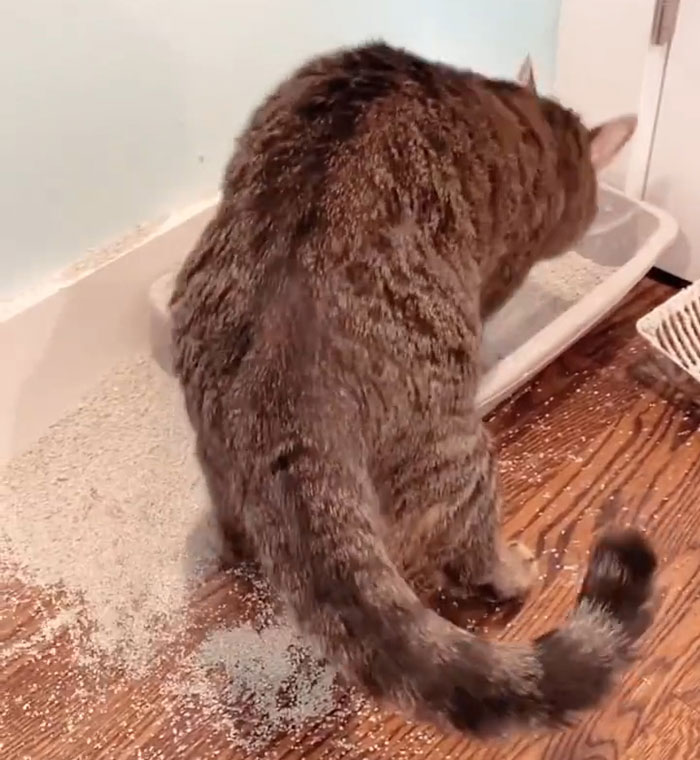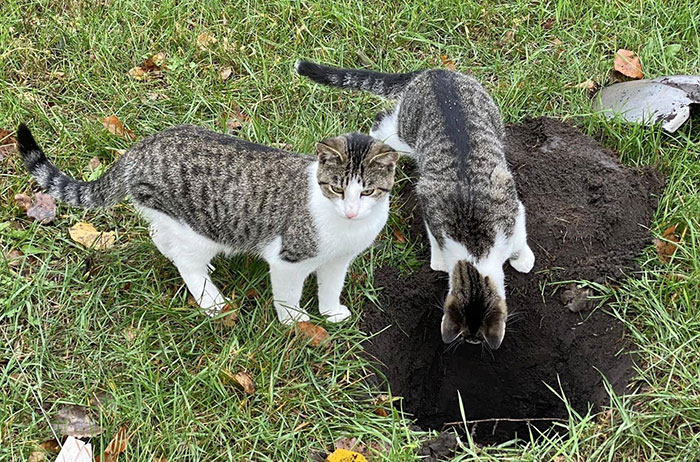Considering we have chosen to domesticate cats and share our homes with them, it is pretty lucky that our furry friends have a natural instinct to bury their waste and use a litter box. This behavior is in their DNA, and both wild cats and domestic cats like to be clean and cover their poop.
Since burying the poop reduces odor and eliminates it from sight, it is an excellent way to keep predators away and to ensure the environment stays hygienic, lowering the risk of infections and parasites spreading from cat to cat.
- Cats bury their waste to hide odor and avoid predators.
- Kittens learn to bury poop from 3-4 weeks old.
- Suddenly not burying poop may indicate health issues.
- Unburied cat poop can signal stress or a dirty litter tray.
- Covering poop is instinctive, not a learned behavior.
The information provided herein is for informational purposes only. Please refer to our disclaimer for more details..
Do all felines bury their excrement?
Generally, yes, most cats get in the habit of burying their poop from a very young age. The kitten learns from their mother, and a cat may start covering their feces as young as 3 or 4 weeks of age.
Image credit: joyandtreasure
If your cats suddenly stop burying their cat poop and you’re finding it left out in the open, this can be a sign of a behavioral or medical issue and is something that warrants a closer look and a trip to the veterinarian.
For instance, a cat with runny stool and a bacterial infection may no longer bury their excrement, and we might find it in the bath or bed. These kitties may well require some treatment in the form of e.g., antibiotics and probiotics.
Why do cats smell their poop before they bury it?
Some owners notice that their cat smells their poop while burying it. This trait passed on from their wild ancestors is their way of knowing when they can stop burying. For them, once the poo smell is no longer too strong, they know their job is done.
Image credit: thecatcafesandiego
It is also worth stating that there are scent markers called pheromones within cat stool, and some cats will sniff their poop to detect this smell, which they use to mark their territory, particularly the more dominant cats.
What does it mean if a cat doesn’t bury its poop?
There can be several reasons why cats stop burying their poop, including:
- Stress or anxiety
- Arthritis and joint pain (very common in older cats)
- A medical issue such as bacterial enteritis, a urine infection, or parasites
- A lack of litter. The litter should sit at least 3cm deep in the box. Fill up your stock of the best cat litter.
- There are not enough litter boxes in the home, or sharing their tray with another cat. This might push cats to poop outside the litter box. Remember, we need multiple litter boxes in a multi-cat household; about 1.5 trays of pet cat
- A dirty litter tray that is not being cleaned regularly enough
For many cats, leaving their stool out is a bit of a ‘dirty protest’; their way of saying that there is something they’re not happy with and that they want their owner to address.
If my cat does not cover their excrement, does this point towards a lack of training?
The issue will not be in training as the behavior is instinctive rather than learned. We must also understand that a cat will never do this out of spite, though it can sometimes seem that this is the case.
As discussed, we will either be dealing with a medical problem or an issue with the litter tray set up within the home.
FAQ
It is usual for cats to hide toys, as if burying poop?
Some kitties will want to bury their prized possessions, including treats or their favorite toys. This can be a way of keeping them away from competition (other cats or people in the home) or stashing them for when they want to utilize them later.
Generally, this would not be done in a litter tray but may be done outside in the soil or inside using bed covers, clothes, or towels.
Should you give your cat a treat when they use their tray?
When first learning what to do, we can give a kitten a high-value treat when they use their tray and bury their poop appropriately. This can be something like a piece of cooked chicken or fish. However, after a couple of weeks, they no longer need us to do this and will happily toilet in their litter box without our insistence or encouragement.
How often should I scoop out my tray?
As a general rule of thumb, owners should be scooping poop out at least once a day, as otherwise, the cat poop may begin to smell strong, even if well buried.
Owners who struggle to clean this often may consider investing in a cat litter box that self-cleans.
Do some cats need a tray with a roof?
Indeed, some of our feline friends will prefer a private toileting experience. Providing a tray with a roof can make these guys more likely to use their trays appropriately.
However, keep in mind that very young and very old cats can struggle to use these kinds of trays, and it can make it hard for owners to keep an eye on their cat’s toileting behaviors, meaning they may not pick up on any medical issues such as constipation or urinary tract infections until quite late on.
178views
Share on Facebook
 Dark Mode
Dark Mode 

 No fees, cancel anytime
No fees, cancel anytime 




















































13
0